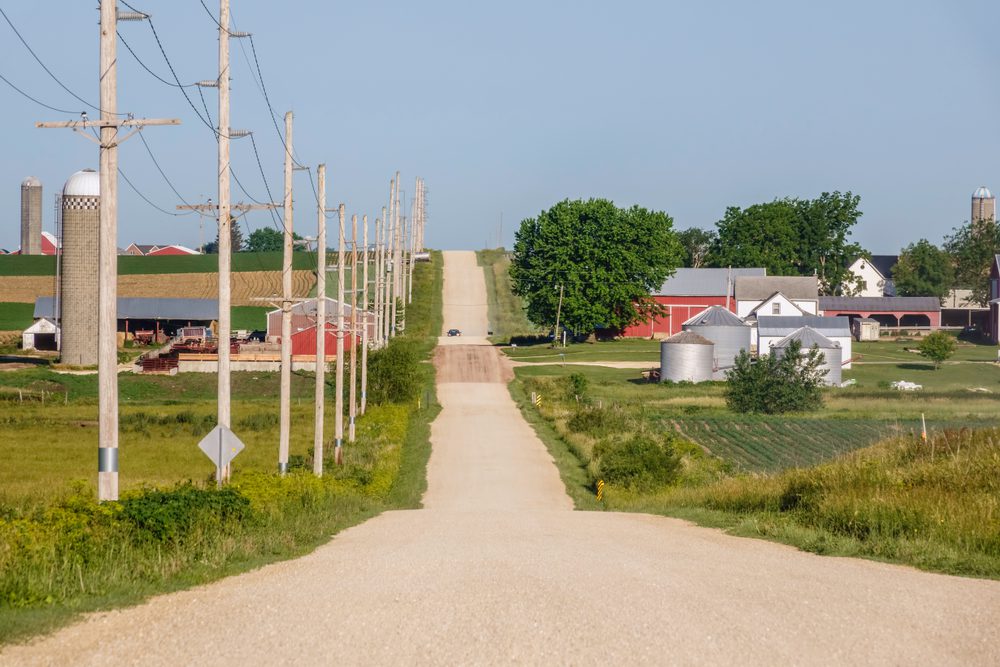
The Greys, a new family of four, after a surprise roadside birth. Photo courtesy Tatjana Michlig Photography
It was a Wednesday night in August. With her toddler in bed, Dani Grey was watching a little TV with her husband, Matt. She was 38 weeks pregnant and had no reason to think she was about to go into labor. But at 11 p.m., contractions began—and quickly escalated to two minutes apart by 11:30 p.m.
“We called the after hours line and they told us to come in,” Dani said. A second quick call went out to family members, who were 25 miles away, to come and be with their sleeping son.
“We started making our way to the vehicle through each contraction,” Dani recalled. “Once we saw our family coming down the road to our house, we left and headed to the hospital in Eau Claire.”
The long drive
For the Greys, the drive they embarked on that night is not one they will ever forget. Living in the rural community of Durand, they had to travel 45 minutes to their birthing center in Eau Claire.
“I couldn’t believe how fast everything was happening,” Dani said. “I was in shock.”
In line with the latest report from the March of Dimes, Dani is one of about 3% of women in Wisconsin who have no birthing hospital within a 30-minute drive. Fifteen percent of counties in the state are defined as maternity care deserts, where there is a lack of maternity care resources, no hospitals or birth centers offering obstetric care, and no obstetric providers. Just 0.9% of maternity care providers practice in Wisconsin’s rural counties.
The shortage of OB-GYNs
From the car, Dani and Matt again called their midwife—who was concerned the couple may not make it to Eau Claire.
“We still had 30 minutes to drive at that point,” Dani explained. “They asked me to make a decision to continue to Eau Claire or go to the Menomonie emergency room.”
A year ago, the Mayo Clinic Health System in Menomonie would have been more prepared for them, but at the end of 2022, that clinic ended its labor and delivery services, consolidating to the Eau Claire location. So if Dani and Matt went to that closer facility, they’d have to deliver in the emergency room.
Why would the clinic move their labor and delivery services? Because they had no doctors.
“Mayo Clinic Health System has been aggressively recruiting for several open OB-GYN positions over the past two years,” said Dr. Richard Helmers, regional vice president, Mayo Clinic Health System in Northwest Wisconsin. “These relentless efforts have been unsuccessful in filling these critical physician openings, reflecting a worsening OB-GYN physician shortage across the country.”
While that shortage may be nationwide, some states have been hit harder than others. In Wisconsin, fewer medical school students are applying to OB-GYN residency programs—there’s been nearly an 8% drop since last year. That’s one of the highest drops for any state in the US. The trend is most pronounced in states with abortion bans.
Dani and Matt Grey decided they had to go to the closer medical care facility. With the Menomonie ER on standby, the Greys were rushing to get there—but Dani’s water broke.
“Two minutes after that, I told Matt he needed to pull over right away and that the baby was coming,” Dani said. “Matt had 30 seconds to pull over and pull down my pants with one hand and catch Wyatt with his other hand. It was literally one quick motion.”
Dani looked at the clock for the time of birth: 12:30 a.m.
The concerns of emergency crews
With the three of them along Highway 25 in Dunn County, Matt called 911. But he had little cell phone reception, and the dispatcher couldn’t hear where they were. So the parents and baby had to continue on to meet the ambulance.
While the Greys’ story had a happy ending, some people were worried that this was exactly what would happen when the Menomonie birthing center closed down.
One of those people was Menomonie Fire Chief Denny Klass. “When Mayo advised us, we all thought, ‘Oh, boy.’”
“We had some concerns. Delivering babies isn’t something we do a lot of on a regular basis,” Klass said.
Even so, Klass’ team was expecting an uptick in helping birthing mothers. He knows that with around 62,000 births in Wisconsin annually, the number of deaths due to pregnancy-related causes is on the rise. And that all has to do with access to maternity care.
“An ambulance isn’t the best place to be delivering a baby,” said Klass. ”We wouldn’t be as prepared to handle difficult deliveries.”
The family of four
Klass is grateful that the Greys had a positive outcome. And so are they Greys. “I’m happy and so relieved that everything and everyone was healthy and safe,” Dani said.
But as these roadside birth stories play out across the state, Klass advised that everyone needs to be prepared—that goes for expectant parents and doctors.
“We never in our wildest dreams thought it would happen like this,” Dani said.
Support Our Cause
Thank you for taking the time to read our work. Before you go, we hope you'll consider supporting our values-driven journalism, which has always strived to make clear what's really at stake for Wisconsinites and our future.
Since day one, our goal here at UpNorthNews has always been to empower people across the state with fact-based news and information. We believe that when people are armed with knowledge about what's happening in their local, state, and federal governments—including who is working on their behalf and who is actively trying to block efforts aimed at improving the daily lives of Wisconsin families—they will be inspired to become civically engaged.


Federal cuts threaten rural progress in Wisconsin, report finds
Across the country, rural Americans are facing challenges that go far beyond headlines and statistics: An Appalachian woman whose life was saved by...

RFK Jr. ignores 100+ studies to push abortion pill ban—this is the mifepristone explainer you need
By Bonnie Fuller Apprehensive OB-GYNs across the country are alerting Americans that Health & Human Services Secretary Robert F. Kennedy Jr. may...

October is Breast Cancer Awareness Month. Here’s how you can help in Wisconsin
It's Breast Cancer Awareness Month. Here's how you can help fight for a cure throughout Wisconsin. October is globally recognized as Breast Cancer...

A new car vs. health insurance? Average family job-based coverage hits $27K
By Phil Galewitz, KFF Health News With the federal shutdown entering its fourth week, spurred by a stalemate over the cost of health insurance for...





